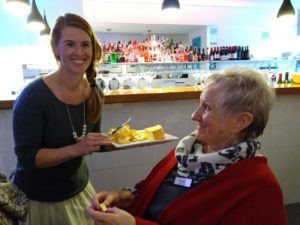The promise of good food and a good story meant there were no spare seats at the Slow Food Saddleback winter tapas dinner at Kiama’s Art Bar on Wednesday 19 June.
As always, Jamie was a friendly and charming front-of-house host and a welcome drink set the scene for an excellent meal with lots of delicious shared tapas followed by gelato and cheeses from The Pines artisan micro dairy in Kiama.

Guest speakers were Kel and Mahlah Grey from the Pines. Since moving back to the family run farm (established in 1854) Kel and Mahlah have followed a well-researched plan to produce first class produce from their small and lovingly cared-for herd.
Pines milk and gelato are well-known in the district and are available at a number of local supermarkets and cafes as well as various markets, both locally and in Sydney. Several local restaurants also use the milk and serve the gelato for dessert. Cheese is the latest venture.
For the past two years Kel and Mahlah have been working hard to set up the equipment and infrastructure to start manufacturing and maturing cheese. They are currently producing small quantities of the fresh soft and semi-hard cheese which were offered for tasting on Wednesday night and are now available at the markets. Kel recently received a scholarship to visit some of the best cheese makers in Britain and is now keener than ever to produce cheeses that reflect the terroir of the farm.
Your correspondent has just returned from Portugal and, listening to Kel and Mahlah speak, couldn’t help but be reminded of the passion of the smaller wine growers in the Douro Valley as they spoke about the unique qualities of their wine and their love and respect for the land producing it.
Kel and Mahlah are more concerned with the quality of each litre of milk than the total number of litres of milk produced. They are also heading towards regenerative farming – encouraging the land to help itself by implementing strategies such as bringing back the trees. In sharing their story Kel and Mahlah showed that there can be a positive future for farming and food production in Kiama and we look forward to seeing the unique quality of the cheeses produced here being recognised worldwide.
